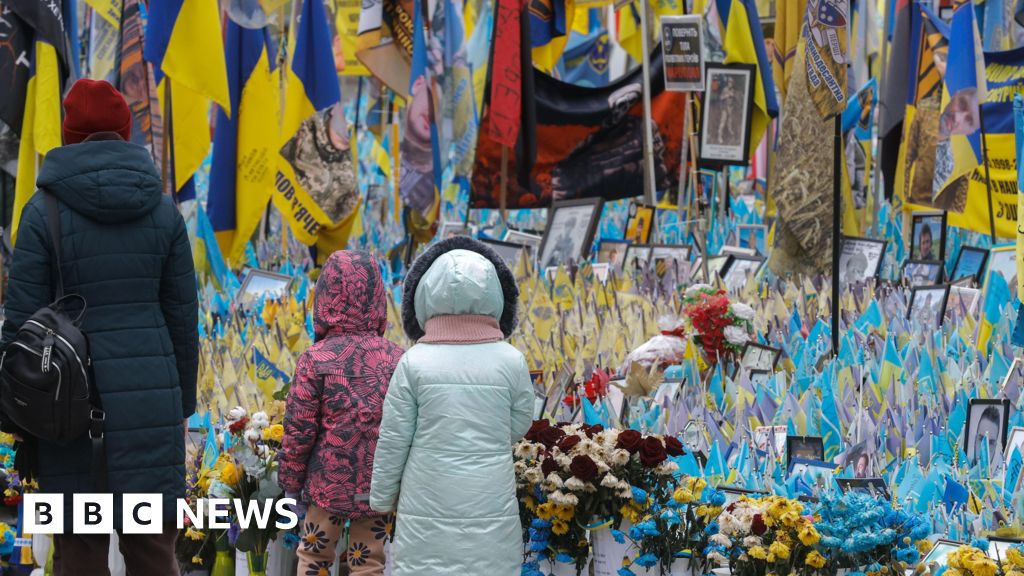
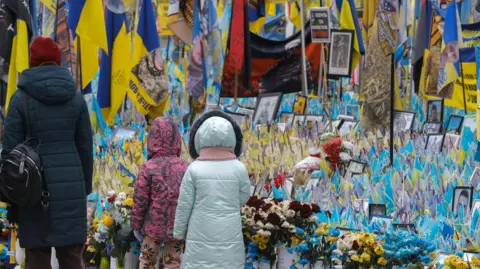
EPA
The Munich Security Conference (MSC) is focusing on the future of Ukraine, just a few days following a surprising phone conversation between US President Donald Trump and Russian President Vladimir Putin, where they agreed to initiate discussions aimed at resolving the ongoing conflict in Ukraine.
Trump referred to the phone call as “great,” expressing a “good possibility of concluding that disastrous and bloody war.”
Ukrainian President Volodymyr Zelensky emphasized the importance of ensuring that Ukraine is included in any peace negotiations.
European allies appeared taken aback by the nature of the call, with French President Emmanuel Macron cautioning that any peace settlement requiring Ukraine to concede to Russia would be detrimental for all parties involved.
While the timeline for peace talks remains uncertain, key issues such as territorial disputes, security negotiations, and Ukraine’s aspirations for NATO membership are expected to be at the forefront of discussions. Here’s an overview of the current positions of the involved parties.
What territory has Ukraine lost, and is it reclaimable?
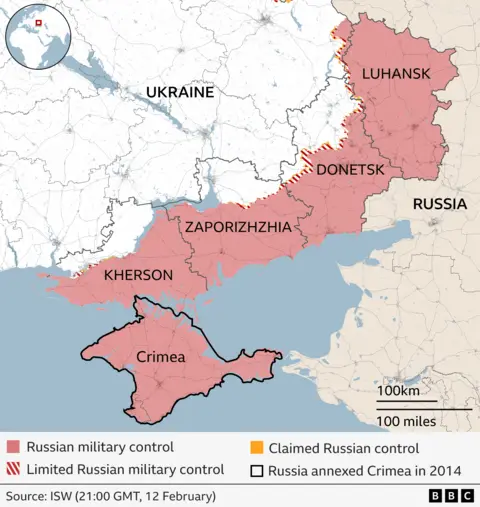
Currently, Moscow has authority over approximately 20% of Ukrainian territory, predominantly located in the south and east.
Following the ousting of Ukraine’s pro-Russian president in 2014, Russia annexed the Crimean Peninsula and supported pro-Russian insurgents during intense conflict in Donetsk and Luhansk regions.
The situation escalated into full-scale armed conflict nearly three years ago following Russia’s extensive invasion.
While Moscow’s attempts to capture the Ukrainian capital, Kyiv, were unsuccessful, Russian forces have gradually extended their territorial control mainly in the eastern part of the country.
Ukrainian forces, supported by military assistance from the US and European allies, have made it challenging for Russia to consolidate these gains and, at times, have successfully reclaimed territory and launched counter-offensives into western Russia.
Ukraine maintains that any peace agreement must mandate the complete withdrawal of Russian troops from its territory back to pre-2014 borders, encompassing Crimea, Donetsk, and Luhansk.
Zelensky affirmed during an MSC press briefing, “We will never acknowledge occupied territories as Russian.”
Conversely, Russia has formally annexed four regions in eastern and southern Ukraine and seeks to have them recognized as part of its territory, despite lacking control over all areas within these regions.
In a recent interview with the Guardian, Zelensky proposed that Russian-occupied territories in Ukraine could potentially be exchanged for territories seized by Ukraine in Russia’s western Kursk region as part of a peace settlement. However, the Kremlin swiftly dismissed this proposal.
Until recently, Ukraine’s western allies supported Zelensky’s stance that all of Ukraine, including Crimea, should be repossessed.
Nevertheless, new US Defence Secretary Pete Hegseth tempered these expectations, stating during a February summit that restoring pre-2014 borders is an “unrealistic objective.”
“Pursuing this illusory goal will merely extend the conflict and inflict further suffering,” he stated.
Is Ukraine poised to join NATO?
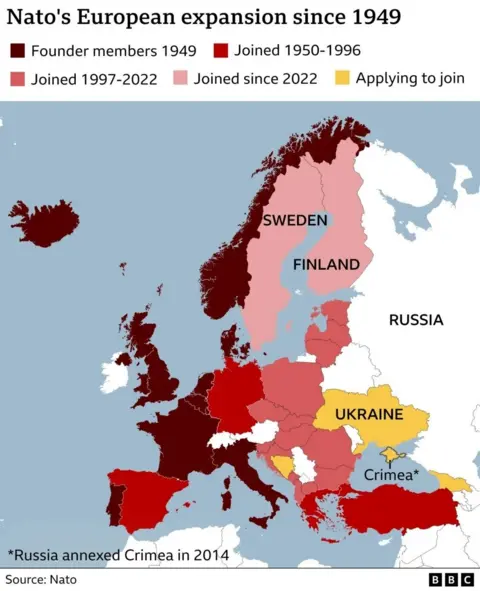
Ukraine is keen to join NATO, asserting that membership in the western military alliance—where nations commit to mutual defense—represents the most effective means to secure its safety.
For Kyiv, the full-scale invasion from Russia underscores the belief that NATO membership is essential for safeguarding its future.
However, Russia remains steadfast in its opposition to Ukraine’s NATO aspirations, concerned that it would lead to NATO forces being stationed too close to its borders.
Upon arriving at the MSC, Zelensky expressed confidence in NATO’s security assurances, stressing that membership would be the most cost-effective solution for all involved.
He further mentioned the necessity for Europe to unite around Ukraine to ensure collective self-defense.
NATO allies have consistently supported the notion of future Ukrainian membership, with UK Prime Minister Sir Keir Starmer affirming to Zelensky that the country is on an “irreversible path” toward inclusion.
Nevertheless, assurances regarding NATO membership appear less certain, particularly after the US Defence Secretary downplayed the chances of Ukraine joining NATO as part of any peace agreement.
Hegseth remarked, “The United States does not view NATO membership for Ukraine as a viable outcome of a negotiated settlement.”
What security guarantees might be proposed?
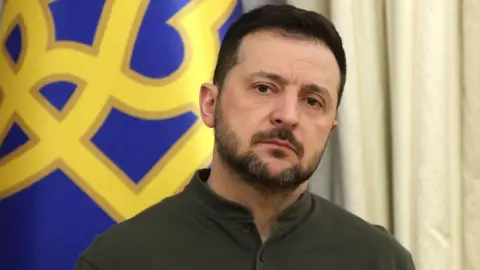
Getty Images
Zelensky remarked that past interactions with US President Donald Trump are “insufficient for formulating a peace strategy.”
While entering the MSC, he noted that the signs from the US were “strong” yet “mixed.”
Hegseth asserted that Trump is the “one person capable of uniting both parties” and stressed that US efforts to negotiate peace do not equate to abandoning Ukrainian soldiers fighting against Russian forces.
In a related note, the US Vice President stated that deploying troops to Ukraine remains “on the table” if Russia does not engage in sincere negotiations for peace.
“The President is not acting blindly,” JD Vance conveyed to the Wall Street Journal.
Previously, in October, Zelensky outlined his vision for victory to Ukraine’s parliament, highlighting key aspects such as NATO membership and collaborative US and EU protection of crucial natural resources, along with a strategy for containing Russia through a non-nuclear tactical deterrent based in Ukraine.
At that time, President Joe Biden, as well as then-presidential contenders Kamala Harris and Donald Trump, received briefings on this plan.
It is unclear which elements of Zelensky’s proposals will be included in future peace discussions, but Hegseth has cautioned against expecting any US military presence in Ukraine as part of a future security arrangement.
Zelensky communicated to the Guardian that he doubts the effectiveness of security guarantees that do not involve US participation.
UK defense sources cited by the Times suggest that the US might provide some form of air defense, potentially including Patriot missiles, to a peacekeeping force in Ukraine in exchange for access to local minerals.










